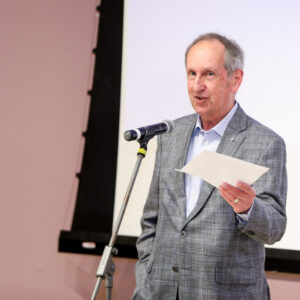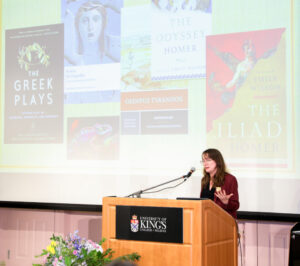Dr. Emily Wilson, acclaimed Homeric scholar and skilled translator, met an enthusiastic welcome at the University of King’s College on March 6th, 2024 for the 10th Alex Fountain Memorial Lecture: “Re-Translating Homer: Why it Matters.”
 The Alex Fountain Memorial Lecture was established by Fred and Elizabeth Fountain in honour of their son Alex, a King’s student, who died in 2009. This annual public lecture is a gift to the student body and wider King’s community, in his memory.
The Alex Fountain Memorial Lecture was established by Fred and Elizabeth Fountain in honour of their son Alex, a King’s student, who died in 2009. This annual public lecture is a gift to the student body and wider King’s community, in his memory.
The event began with an introduction from moderator Hilary Ilkay, Senior Fellow in the Humanities and a dedicated Foundation Year Program tutor, who shared her passion for Homeric translation.
Entering to applause that could rival hockey stadiums, Emily Wilson was welcomed to Alumni Hall as an acclaimed Classicist. Her translations of ancient texts are read across the world, including in the Foundation Year Program. Wilson is a scholar of Classics at the University of Pennsylvania, having also studied at Oxford University and Yale University. Her 2023 English translation of The Iliad is her newest book.
As I looked around the room, I saw a sea of students watching on the edge of their seats. On a Wednesday night, students had flooded out of their residences to contribute to the buzzing atmosphere of a packed lecture hall. We all gathered to think about central questions: What is translation? How can translation convey meaning across different cultures and eras? Why do we still read Homer in the 21st century?
Throughout her lecture, Wilson explored the history of Classical translation, the value of studying ancient works and the complex task of translating Ancient Greek for modern audiences.
 Seeing intimate connections with the present day, Wilson explored the themes of honour, celebrity, violence, conflict, pain, difference and plague in The Iliad with both humor and depth. She explained that her readings of Homer “feel different” and develop new resonances as she gains new lived experiences: becoming a parent, moving to a new country, watching footage of Gaza on the news.
Seeing intimate connections with the present day, Wilson explored the themes of honour, celebrity, violence, conflict, pain, difference and plague in The Iliad with both humor and depth. She explained that her readings of Homer “feel different” and develop new resonances as she gains new lived experiences: becoming a parent, moving to a new country, watching footage of Gaza on the news.
Wilson read aloud excerpts of her English translation of The Iliad, and the same passages in Ancient Greek with a bellowing intensity that echoed some of her goals in translation: to maintain the momentum, emotionality and sonic experience of the work. Wilson expressed her understanding of translation as an art and science that goes far beyond a word-for-word process of substitution, as one might do on a Spanish quiz. Rather, she introduces translation as a practice intimately bound up with culture. She identifies her desire to “evoke the whole experience of these texts” in her writing, describing translation as a “bridge between two different worlds.”
Wilson related her work to many contemporary topics and debates in Classical studies and beyond and had the audience reeling with laughter from her reference to the “Barbie” movie (It turns out that one could say that Achilles, much like Ken, had the job of “beach.” I’ll be patiently awaiting her translation of the “Barbie” movie into Ancient Greek).
Embodying both the electric, hilarious energy in the room, and the relentless enthusiasm that Wilson brings to the field, I will end with Wilson’s answer to a student’s question—what advice do you have for current Classics students?
Wilson thoughtfully replies, “Any moment that you’re not reading Homer—you should be reading Homer!”
Find out about past editions of the Alex Fountain Memorial Lecture.

